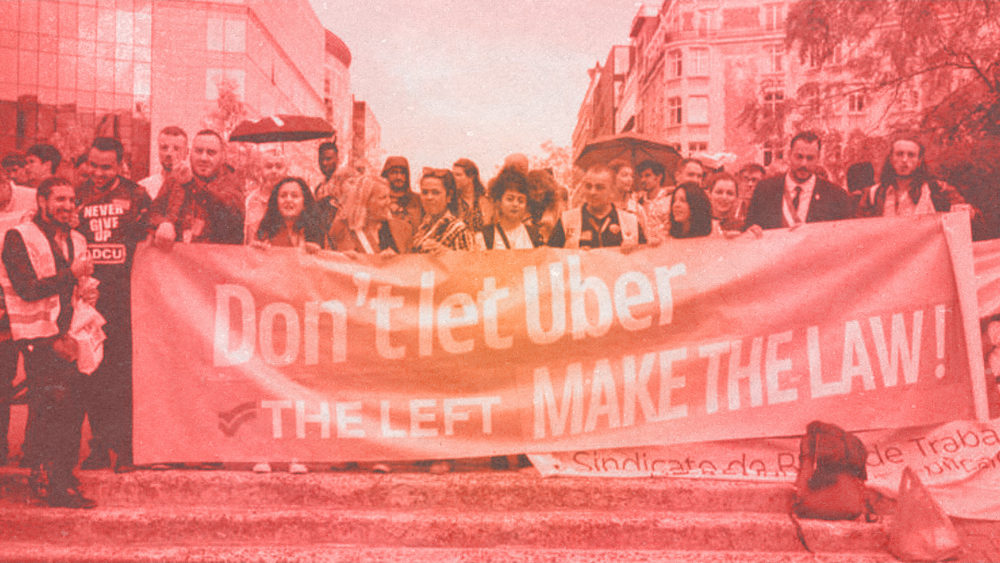16 trade unions and gig worker collectives call on the labour ministers in the European Union to support their struggle for decent work against platforms’ abuse.
Dear Ministers of Labour of the Member States of the European Union,
On 12th and 13th June, you will have to vote on the directive on the rights of platform workers. For us, platform workers, this directive is crucial. Our lives depend on it. The directive should determine our status (self-employed or employed), our relationship with the platforms and the transparency of their algorithms.
We are riders or drivers. We chose these jobs naively believing in the myth of entrepreneurial freedom. We thought we would be free to set our prices, choose our hours and determine our working conditions. But the reality is quite different. We spend our days waiting for an order or an errand, as if held hostage without knowing when an errand will be allowed. If we were to refuse one, the platform would always allocate us less.
Many of drivers like us work up to 13 hours a day, 7 days a week. Uber, Bolt, Heetch, these platforms use us as their slave. Dependent on their will, we are under their control, for fear of not being able to make ends meet. For 70 hours of work per week, we are numerous actually to earn only 1300€ per month. 4.30 per hour. Is this a desirable, dignified income for anyone who wants to serve their fellow citizens? The platforms are never out of pocket. They charge us commissions of up to €40 per journey. How does the simple “connection” justify these commissions? How much wealth do these companies produce by simply bringing a customer and a driver together? As a result of the prices imposed by the platforms, more and more of us are no longer able to reimburse our car rentals or pay our insurance. Subjected to the platforms’ conditions, we can no longer make a decent living.
As bike couriers, we often cycle more than 100km a day to deliver meals. Against the wind, in the rain, in the snow or in the middle of a heat wave, we pedal so that sushi, burgers or pizzas arrive in the best possible conditions to the customer. Whatever the weather, we pedal as fast as we can to meet the delivery deadlines. The application gives us the orders. And in order to arrive on time, the application commands us to disregard traffic regulations. If there is an accident during a delivery, the platforms, so quick to supervise us, disappears immediately. No work accident, no sick leave, nothing is taken care of by UberEats, Deliveroo or Wolt. Neither are our equipment nor our health.
This weakens us physically and psychologically. The pressure is such that heart attacks are common in our professions, and accidents happen every day. The fear of missing a race, the hours spent waiting under tension weaken our human relationships. More and more of us are going through divorces, the distance from our families and the isolation imposed on us by our work.
We were told we were “partners”, we thought we were treated as equals, but we are not. We are just digital slaves in the service of an algorithm. Officially independent but in reality openly subordinate to the platforms. For it is they who set our prices, choose our appearance, impose our routes and travel times. During the pandemic, many of us served our fellow citizens. Who delivered your groceries, your meals, when it was forbidden to go out? Who cycled through deserted streets, scared to death, terrified of bringing home a virus we knew nothing about? At the end of the pandemic, without a word, the platforms blocked thousands of us. Because yes, Uber, Deliveroo and the other platforms “disconnect” us when they don’t want us anymore, without reasons, without any possibility of explanation with a human and without recourse. No human resources or after-sales service for us. Our attempts to meet with them go unheeded. It is as if we have been erased overnight, dehumanising our work and our existence.
We never know why we get one ride and not another, why it is assigned to one delivery person, one driver, rather than another. An algorithm determines and controls our work without interruption and without any form of transparency. And while we work under the orders of a machine, our data is constantly being collected and processed without us being able to object.
We pay our taxes, while the platforms themselves avoid and evade them. We say it: this is an unacceptable unfair competition, which stimulates the lowest social standards. As always, in this context, employees are the adjustment variable.
Platforms are trying to convince you that what we need is a “social dialogue”, between us and them. This idea is really just a pretext to avoid the platforms having to assume their duties as employers. What we need are real rights, written in stone, not false discussions to get crumbs.
Leaks in the media tell us that you are considering the discretionary right of Members not to apply the presumption of employment in the event of collective agreements or laws existing beforehand: our rights must have a common base throughout Europe and derogations are unacceptable.
We know that many of you are tempted to support the ultra-liberal model of platforms. According to the European Commission, platforms have had more than a hundred meetings with the Directorate for Employment, Social Affairs and Inclusion during the period when the directive was being written. Trade unions and workers are chased away when they come to plead their case. This is not what your constituents expect from you.
Labour Ministers of the EU Member States, our lives depend on your deliberations. It is your duty to recognise our subordination to platforms. We ask you, on the day of your council, to ensure that you support a directive that will allow unconditionally and without criteria :
- Transparent and safe use of algorithms;
- Respect for the rights of truly self-employed workers;
- The correct classification of workers who should be employees without having to go to court to for it;
- Fair competition between platforms and other companies.
Finally, we demand that there be a presumption of employment, not subject to a series of conditions, such as compliance with 3 points out of seven. In our experience, these types of conditions lend themselves to circumventing the law by looking for shortcuts.
In this sense, we support the proposal made by the European Parliament, in which there is a presumption of employment and it is the companies that have to claim that the workers are autonomous in each context, without there being a list of criteria that can be circumvented.
Likewise, this presumption of employment must be governed by all member states. The door should not be opened for states to fail to comply with it, since that would mean opening the door for the powerful lobby to act in all states, one by one, and eliminate our rights here and there.
We are at the end of the road. We are counting on you to take over. We will then know on the day of the council if you are riding for Uber or for the people.
Signatures :
- Intersyndicale Nationale VTC, France
- Taxiunionen, Sweden
- Riders collective & vida trade union, Austria
- GigWatch, Sweden
- Collectif des coursier-es bruxellois-es, Belgium
- Elite Taxi, Spain
- Taxi Project, Spain
- RiderXderechos, Spain
- Deliverance Milano, Italia
- Lieferando Workers Collective, Germany
- Collectif des Livreurs Autonomes de Plateformes, France
- Syndicat CGT des Livreurs Ubérisés Toulousains, France
- Federatie Nederlandse Vakbeweging, Netherlands
- FO just eat, France
- ADCU App Drivers and Couriers Union, UK
- Filt Cgil Emilia Romagna, Italy
Photo: The Left
This article was originally published by the Progressive International
Do you want to be informed of DiEM25's actions? Sign up here















